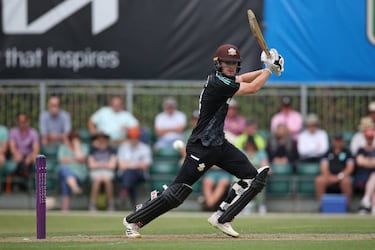Why is it called a hat-trick when a soccer player scores three goals?
There is a particular kudos that comes with scoring three goals in a single soccer match - but why do we refer to the feat as a hat-trick?


Cristiano Ronaldo has done it 60 times; Lionel Messi, 55. Back in the mid-20th century, Brazilian great Pelé managed it on no fewer than 92 occasions.
In soccer, there really is a particular prestige to scoring a hat-trick. Sure, it’s nice to get off the mark with a goal, or even plunder a brace; but a striker has really earned their keep if they can find the net three times in a single game. British journalist Adam Hurrey, the author of the book Football Clichés, has described the hat-trick as a “perfectly poised footballing achievement”.
Bale, Rooney, Ronaldo...
Hat-tricks have signalled the arrival of a superstar - see Gareth Bale’s gallivanting 2010 treble against Inter Milan, or Wayne Rooney’s explosive debut for Manchester United in 2004. They have even persuaded fans to applaud opposing players, an honour United’s home crowd bestowed on Ronaldo Nazário when he pinged in three goals for Real Madrid in a 2003 Champions League tie at Old Trafford.
Back in 1966, meanwhile, Geoff Hurst’s World Cup final hat-trick for England prompted Kenneth Wolstenholme to utter probably the most famous line ever spoken by an English-language soccer commentator:
And after no other feat does a soccer player get to take the match ball home.
Hurst’s three-goal haul in ‘66, it’s worth noting, is also an example of what’s known in soccer as the ‘perfect’ hat-trick: scoring one with the right foot, one with the left, and one with a header.
Where does the term ‘hat-trick’ come from?
Cricket, it seems. In the bat-and-ball sport, invented by the English some time around the 16th century, a bowler is said to have achieved a hat-trick if they get three batsmen out from three successive deliveries. Cricket’s use of the term only for consecutive wickets clearly differs from soccer, which counts three goals scored at any point in the same match as a hat-trick.
According to the Extended Oxford English Dictionary, cricket adopted the phrase in the mid-19th century, when a bowler was rewarded for taking three straight wickets by being given a hat. “It came into use after HH Stephenson took three wickets in three balls for the all-England eleven against the twenty-two of Hallam at the Hyde Park ground, Sheffield in 1858,” the OED says. “A collection was held for Stephenson (as was customary for outstanding feats by professionals) and he was presented with a cap or hat bought with the proceeds.”
In his book Arm-ball to Zooter: a Sideways Look at the Language of Cricket, Lawrence Booth says another, similar explanation is that after a bowler managed a hat-trick, “a collection would be taken among the crowd, who generously placed their florins and farthings in - you guessed it - a hat.”
In Allen’s Dictionary of Phrases, the lexicographer Robert Allen agrees that ‘hat-trick’ entered sporting parlance via cricket in the 19th century. “In the 1870s,” Allen says, “the phrase is found in a Cricketing Companion written by one of the family of Lillywhites: ‘Having on one occasion taken six wickets in seven balls, thus performing the hat-trick successfully’.”
However, Allen also notes that another possible reason for the use of the term to refer to a series of three is its connection to magicians. “A hat-trick was originally a trick performed by a conjuror, typically involving three hats,” he writes.

Use beyond the world of sport
Related stories
While it is sport that launched ‘hat-trick’ into the everyday lexicon, its use has expanded into all other fields of life. In June 2021, for example, writer Michael Wolff’s third book on the Trump presidency was greeted by the Times headline: “Trump author completes hat‑trick with inside story of defeat.”
And although the term generally refers to accomplishments, it can also be used to describe negative circumstances or outcomes. For example, when the UK’s governing political party, the Conservatives, were beaten in three local by-elections at the end of June, several British newspapers reported that the Tories had suffered a “hat-trick of defeats”.

